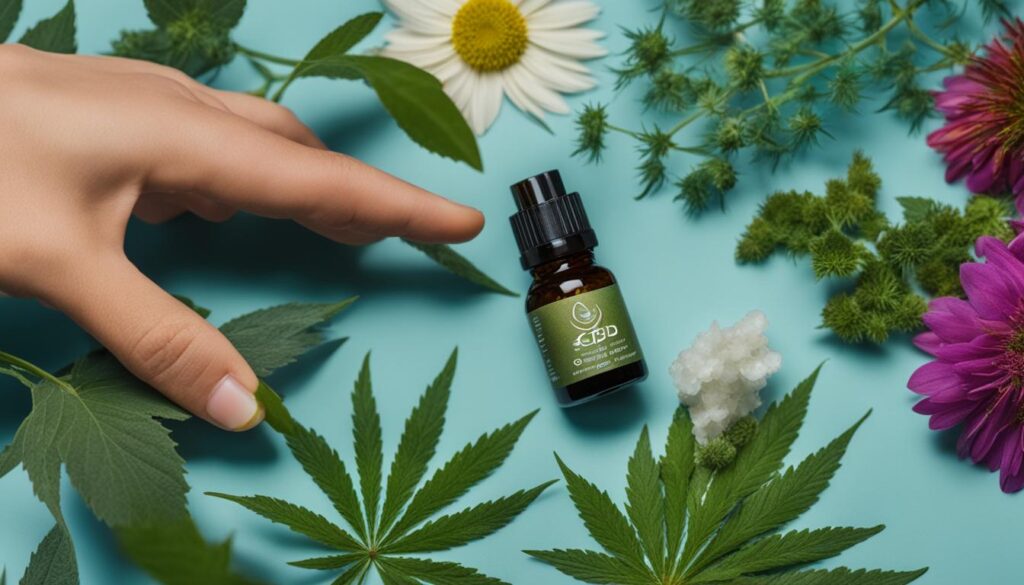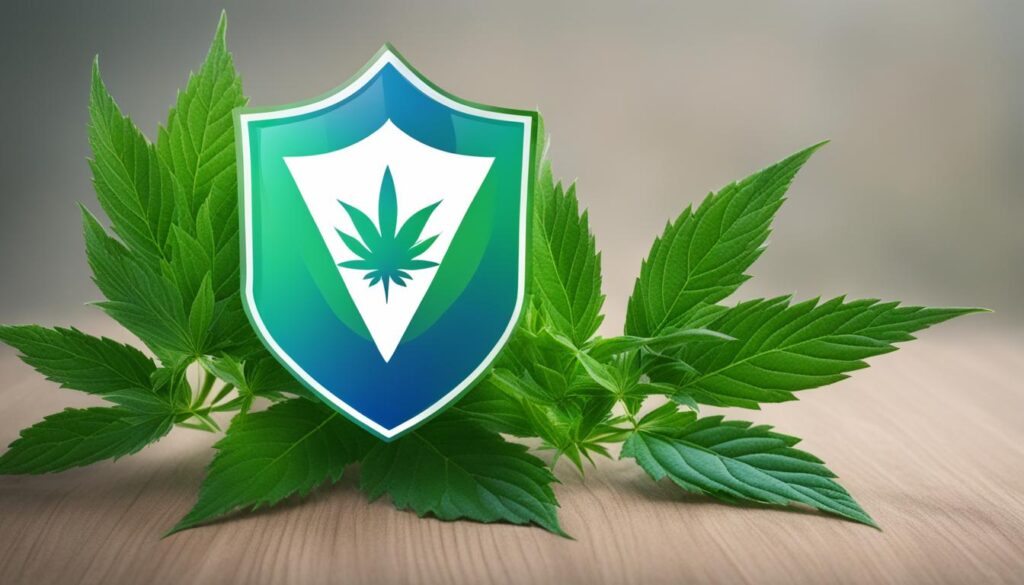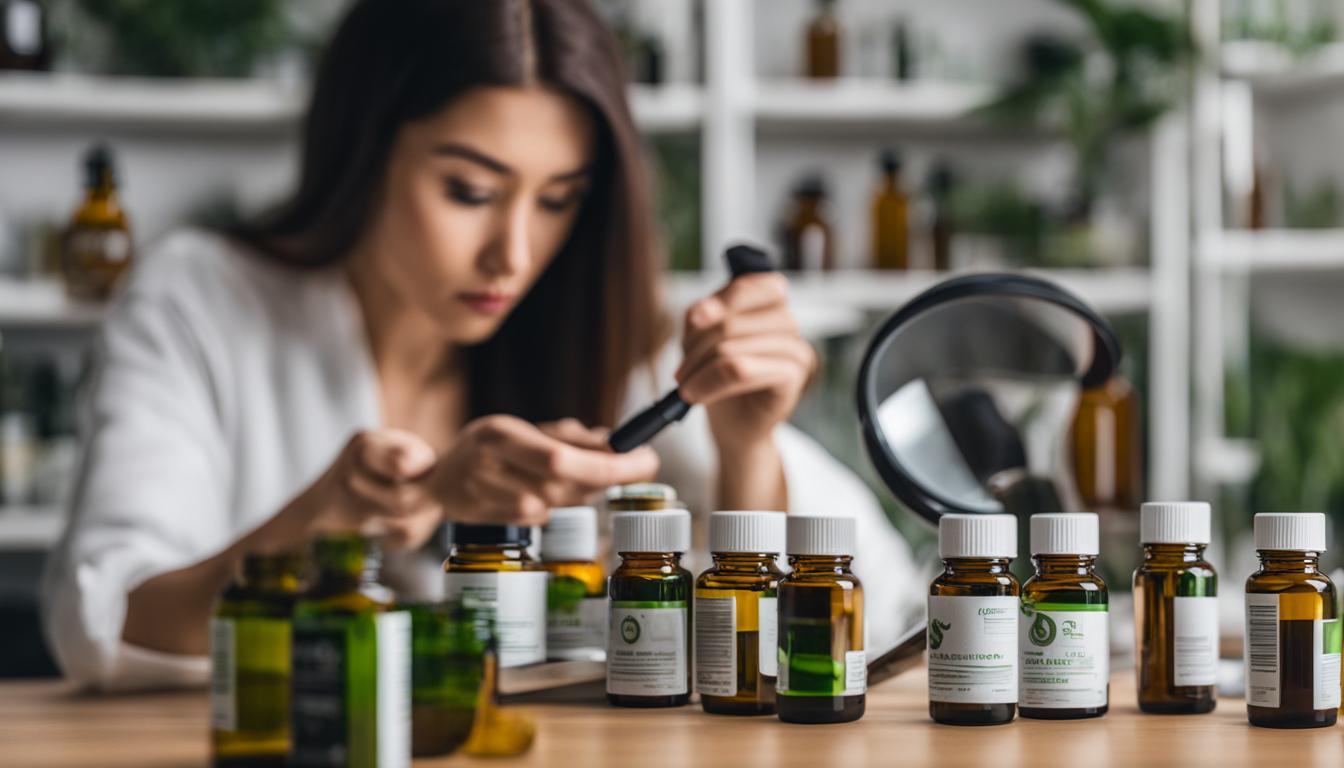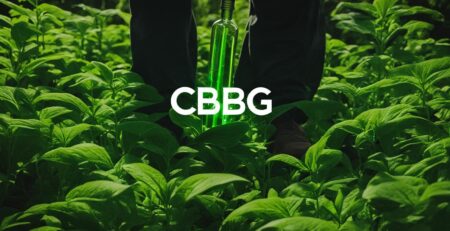Your Guide to Making the Right Choice When Buying CBD Oil
Welcome to our comprehensive CBD oil buying guide. If you're considering incorporating CBD into your wellness routine, it's important to navigate the market with confidence. With the increasing popularity of CBD products, it can be overwhelming to make the right choice. But fret not, we're here to help you understand the key factors to consider when purchasing CBD oil. From legality to potency, we'll cover all the essential tips to ensure you choose the right CBD oil for your needs.
Key Takeaways:
- Understand the legality of CBD in your state, as laws may vary.
- Consider the type of CBD product that suits your preferences and needs.
- Check for a reputable provider who conducts third-party lab testing and provides a Certificate of Analysis (COA).
- Take into account the potency and concentration of CBD in the product.
- Ensure the CBD oil is sourced from U.S.-grown organic hemp and has minimal additives.
Is CBD Legal?
CBD legality is a complex topic due to the various regulations at both the federal and state levels. Understanding the legal status of CBD products is crucial before making a purchase. Here's what you need to know about the legality of CBD in the United States.
In 2018, the Farm Bill was passed, which legalized hemp-derived CBD products that contain less than 0.3% THC on a federal level. This means that CBD products made from hemp plants and containing low levels of THC are generally legal in all 50 states. However, it's important to note that CBD products derived from marijuana plants, which have higher THC levels, are still federally illegal.
While hemp-derived CBD is federally legal, the legality of CBD products can vary from state to state. Some states have specific laws and regulations regarding the sale, possession, and use of CBD. For example, in some states, CBD may only be legal for medical use with a doctor's recommendation, while other states have legalized both medical and recreational use of marijuana and CBD products with higher THC levels.
To ensure compliance with local regulations, it's essential to research and understand the specific CBD laws in your state before purchasing CBD products. Be aware that the FDA has not approved nonprescription CBD products, and some products on the market may be inaccurately labeled or contain harmful ingredients. It's always recommended to buy CBD products from reputable sellers and check for third-party lab testing and Certificates of Analysis (COAs) to verify the product's quality and safety.
The Legality of CBD in the United States – State by State
| State | Legal Status of CBD |
|---|---|
| Alabama | Restrictions on THC content; CBD products allowed for certain medical conditions |
| California | Legal for both medical and recreational use |
| Florida | Legal for medical use; restrictions on THC content |
| New York | Legal for both medical and recreational use |
| Texas | Legal for medical use with certain conditions; restrictions on THC content |
Note: The table above is just a sample and does not represent the complete list of states and their CBD laws. Please refer to your state's specific regulations for accurate and up-to-date information.
In conclusion, the legality of CBD depends on various factors, including the source of the CBD (hemp vs. marijuana) and the THC content. While hemp-derived CBD with less than 0.3% THC is federally legal, state laws can differ, so it's important to research and understand the specific CBD laws in your state before purchasing CBD products.
Understanding CBD and Its Effects
CBD, or cannabidiol, is a cannabinoid found in the cannabis plant. Unlike THC, CBD does not cause psychoactive effects, meaning it does not make you feel “high.” Instead, CBD is known for its potential therapeutic properties, making it a popular choice for those seeking natural remedies.
Research on CBD is still ongoing, but anecdotal evidence suggests that it may have a variety of benefits. CBD is believed to have anti-inflammatory properties, which can help reduce pain and inflammation in the body. It is also known for its analgesic effects, potentially providing relief from conditions such as chronic pain.
Moreover, CBD has shown promise in addressing mental health conditions like anxiety and depression. Many individuals report that CBD helps them feel calmer and more relaxed, without the side effects often associated with pharmaceutical medications. However, it is important to note that more research is needed to fully understand the effects of CBD on mental health.
Furthermore, CBD is generally well-tolerated and does not have the same potential for abuse or dependence as other substances. This makes it an attractive option for those seeking natural alternatives for their health and wellness needs. However, it is always advisable to consult with a healthcare professional before starting any CBD regimen, especially if you have pre-existing medical conditions or are taking other medications.
“CBD has shown potential in providing relief for a variety of conditions, such as pain, anxiety, and inflammation. However, it is important to note that everyone's experience with CBD may vary, and more research is needed to fully understand its effects on different individuals.”
The Importance of a Certificate of Analysis (COA)
When it comes to purchasing CBD products, ensuring their quality and safety is of paramount importance. One key tool that can help consumers make informed decisions is a Certificate of Analysis (COA). A COA provides detailed information about the composition of a CBD product and is typically issued by third-party labs that specialize in testing cannabis products. Let's explore why a COA is crucial for CBD product quality control.
A reliable COA confirms the CBD content and presence of other cannabinoids in a product. It serves as evidence that the CBD product contains what it claims to contain, helping consumers avoid misleading labeling or inaccurate potency claims. Additionally, a trustworthy COA will also indicate the presence of contaminants such as pesticides, heavy metals, or residual solvents. This information is vital for ensuring consumer safety and avoiding potential health risks.
“A COA provides assurance that the CBD product has undergone rigorous testing for quality and safety.”
It's important to note that the COA should come from a third-party source, independent of the manufacturer, to ensure unbiased and accurate results. This helps maintain transparency and builds trust between consumers and CBD manufacturers. By providing access to COAs, reputable CBD brands demonstrate their commitment to quality and consumer satisfaction.
| Information Provided in a COA: | Importance: |
|---|---|
| CBD content and potency | Confirms the amount of CBD in the product |
| Potential presence of other cannabinoids | Indicates the spectrum of cannabinoids present (full-spectrum, broad-spectrum, or isolate) |
| Contaminant testing | Ensures the absence of harmful substances like pesticides and heavy metals |
| Batch number | Facilitates traceability and quality control |
When evaluating CBD products, it's crucial to prioritize those that have readily accessible COAs. This demonstrates the brand's commitment to transparency and ensures that you are making an informed decision about the quality and safety of the product. By verifying the CBD content, presence of other cannabinoids, and absence of contaminants, you can confidently choose a CBD product that meets your needs and expectations.
Key Points:
- A COA is a crucial tool for CBD product quality control.
- It confirms the CBD content and presence of other cannabinoids, ensuring accurate labeling and potency claims.
- A reliable COA also indicates the absence of harmful contaminants, such as pesticides and heavy metals.
- Consumers should prioritize CBD products with readily accessible COAs from trusted third-party sources.
Understanding CBD Potency and Product Types
When it comes to CBD products, understanding potency and product types is essential for making an informed purchase. CBD products vary in their concentration of CBD, meaning the amount of CBD they contain. The potency of CBD is typically measured in milligrams (mg), and it can range from low to high strength. Knowing the potency of a CBD product allows you to determine the appropriate dosage for your needs.
There are different types of CBD extracts, each offering unique benefits. CBD isolate is the purest form of CBD, containing only CBD and no other cannabinoids or compounds. Broad-spectrum CBD contains multiple cannabinoids and compounds, excluding THC, making it a suitable option for those who want to avoid THC's psychoactive effects. Full-spectrum CBD, on the other hand, contains CBD along with trace amounts of THC, which may enhance its therapeutic effects through what's known as the entourage effect.
CBD products come in various forms, catering to different preferences and needs. CBD oils are popular and versatile, allowing for customizable dosing and easy administration under the tongue. Edibles, such as gummies or capsules, offer a convenient and discreet way to consume CBD. Vaporizers and e-liquids are commonly used for inhalation, providing fast-acting effects. Topicals, including creams and lotions, are applied directly to the skin for localized relief.
To help you better understand CBD potency and product types, we've provided a comprehensive table below:
| Product Type | Potency | Description |
|---|---|---|
| CBD Isolate | Varies | The purest form of CBD, containing only CBD with no other compounds. |
| Broad-Spectrum CBD | Varies | Contains multiple cannabinoids and compounds, excluding THC. |
| Full-Spectrum CBD | Varies | Contains CBD along with trace amounts of THC for potential entourage effect. |
| CBD Oil | Varies | Commonly consumed sublingually, providing customizable dosing options. |
| Edibles | Varies | Gummies, capsules, or other CBD-infused food products for easy consumption. |
| Vaporizers | Varies | Inhalation method for fast-acting effects. |
| Topicals | Varies | Creams, lotions, or balms applied directly to the skin for localized relief. |
By understanding CBD potency and product types, you can make an informed decision when selecting the right CBD product for your specific needs and preferences. Remember to always consult with a healthcare professional before starting CBD, especially if you have any underlying medical conditions or are taking medications.
Image source: https://seowriting.ai/32_6.png
Factors to Consider When Buying CBD Oil
When it comes to purchasing CBD oil, there are several important factors to take into consideration. By understanding these factors, you can make an informed decision and choose a high-quality product that meets your needs. Here are some key considerations to keep in mind:
1. Certificate of Analysis (COA)
A Certificate of Analysis (COA) is an essential document that verifies the content and quality of a CBD product. It provides information about the CBD content, presence of other cannabinoids, and any potential contaminants. Look for products that have been tested by third-party laboratories, as this ensures unbiased results. A reliable COA will give you confidence in the potency and purity of the CBD oil you're purchasing.
2. THC Content
Another important factor to consider is the THC content of the CBD oil. THC is the psychoactive compound found in cannabis, and it's important to know the level of THC in the product you're buying. If you want to avoid any psychoactive effects, look for CBD oils that are labeled as THC-free or with a THC content of less than 0.3%. This information should be clearly stated on the product label or COA.
3. Quality and Sourcing
When purchasing CBD oil, it's crucial to prioritize quality and sourcing. Look for products that are made from U.S.-grown hemp, as this ensures compliance with regulations and quality standards. Additionally, consider products that are organic and non-GMO certified, as these indicate a commitment to using high-quality ingredients. Avoid CBD oils with unnecessary additives or fillers by checking the ingredient list and opting for products with a short and transparent list.
4. Carrier Oils and Product Type
Consider your preferences when it comes to carrier oils and the type of CBD product you're looking for. CBD oils are available in various carrier oils such as MCT oil or hemp seed oil, each with its own benefits. Research the different options and choose one that aligns with your preferences and needs. Additionally, consider the product type that suits you best, whether it's tinctures, capsules, topicals, or other forms of CBD oil.
5. Reputation and Customer Reviews
Lastly, take the time to research and consider the reputation of the CBD oil brand you're interested in. Look for brands that have a good reputation for quality and transparency. Read customer reviews and testimonials to get insight into other people's experiences with the product. This can help you gauge the effectiveness and overall satisfaction of previous customers, providing you with valuable information before making your purchase.

By considering these factors when buying CBD oil, you can make an informed decision and choose a product that meets your specific needs. Remember to prioritize quality, transparency, and your personal preferences to ensure you're purchasing a high-quality CBD oil that can support your health and wellness journey.
Where to Buy CBD Oil
When it comes to purchasing CBD oil, there are several options available, including buying online, from CBD oil retailers, or from dispensaries. It's important to choose a trusted and reputable source to ensure the quality and authenticity of the product. Here are some options to consider:
Buying CBD Oil Online
Buying CBD oil online offers convenience and a wide selection of products. Reputable online retailers provide detailed product information, customer reviews, and third-party lab results. Look for websites that have clear labeling, including information on CBD content, THC levels, and ingredients. It's also advisable to check for customer reviews and ratings to gauge the reputation of the brand or website. Remember to consider shipping times and any applicable return policies before making a purchase.
CBD Oil Retailers
Many health stores and wellness shops now carry CBD oil products. These retailers often have knowledgeable staff who can provide guidance and recommendations based on your needs. When buying from a physical store, you have the advantage of being able to see the product in person and ask questions before making a purchase. However, not all retailers may carry CBD products with a reliable Certificate of Analysis (COA), so it's important to verify the product's quality and potency.
Dispensaries for CBD Oil
In states where marijuana is legalized for recreational or medical use, you can purchase CBD oil with higher THC levels from state-licensed dispensaries. These dispensaries are regulated and require specific certifications to operate legally. If you are in a state where only medical use is legalized, you may need a physician recommendation to purchase CBD oil from a dispensary. When buying from a dispensary, you can expect a wide range of CBD products and knowledgeable staff to assist you in finding the right option for your needs.
Remember, regardless of where you choose to buy CBD oil, it's important to do your research and ensure that the product meets your standards for quality, safety, and purity. Look for products that have been tested by third-party laboratories and have a Certificate of Analysis to verify their contents. Be cautious of vague labeling or companies that are unwilling to provide information about their products. By taking these precautions, you can feel confident in your CBD oil purchase.
Safety Considerations and Side Effects of CBD
When it comes to using CBD, it's essential to prioritize safety and be aware of any potential side effects. While CBD is generally considered safe, there are a few factors to keep in mind to ensure a positive and responsible experience.
Interactions with other medications: CBD can interact with certain medications, which can result in increased side effects. It's crucial to consult with a healthcare provider before incorporating CBD into your regimen, especially if you're regularly taking other medications. Your healthcare provider can help determine the appropriate dosage and monitor your reaction to CBD.
Possible side effects: While CBD is well-tolerated by most individuals, it's important to be aware of potential side effects. Some common mild side effects may include fatigue, dry mouth, and upset stomach. These side effects are usually temporary and subside with time. If you experience any severe or persistent side effects, it's recommended to discontinue use and consult with a healthcare professional.
Use during pregnancy: The safety of CBD use during pregnancy has not been fully established, and it's generally recommended to avoid using CBD products during this time. Limited research is available on the effects of CBD on pregnancy, and until more conclusive studies are conducted, it's best to err on the side of caution and refrain from using CBD if you are pregnant or breastfeeding.

By considering these safety precautions and being mindful of potential side effects, you can use CBD responsibly and make informed decisions about its use in your wellness routine.
Conclusion
In conclusion, this CBD oil buying guide provides you with the necessary information to make an informed decision when purchasing CBD oil. We have covered important factors such as legality, understanding CBD properties, checking for a Certificate of Analysis (COA), and considering potency and product types.
First and foremost, it is crucial to ensure the legality of CBD oil in your state. Familiarize yourself with local regulations to avoid any legal issues. Additionally, understanding the properties and potential benefits of CBD is essential for determining if it aligns with your specific wellness goals.
When purchasing CBD oil, always look for products with a reliable COA from a third-party lab. This ensures accuracy in CBD content and helps identify the presence of any contaminants. Furthermore, considering the potency and product type that best suits your needs is crucial for a satisfactory experience.
Lastly, it is important to prioritize safety by choosing reputable sellers who provide organic and non-GMO options. Be cautious of potential interactions and side effects, and consult with a healthcare provider before incorporating CBD into your routine, especially if you are taking other medications.
FAQ
Is CBD legal?
The 2018 Farm Bill made hemp-derived CBD products with less than 0.3% THC federally legal. However, CBD products with higher THC content are federally illegal. State laws on CBD may vary, so it's important to check local regulations. The FDA has not approved nonprescription CBD products.
What are the properties and effects of CBD?
CBD is a cannabinoid found in the cannabis plant. It has properties such as anti-inflammatory, analgesic, and anxiolytic. While scientific research on CBD's medical benefits is ongoing, anecdotal evidence suggests it can provide relief for conditions like depression, anxiety, and pain. CBD is generally well-tolerated and does not lead to abuse or dependence.
What is a Certificate of Analysis (COA) and why is it important?
A COA confirms the CBD content and presence of other cannabinoids in a product. It should come from a third-party source, not the manufacturer, for unbiased results. A reliable COA will also indicate the presence of contaminants like pesticides, heavy metals, or residual solvents. Choosing a product with a trustworthy COA is crucial for ensuring quality.
What is CBD potency and what types of products are available?
CBD products vary in potency and can be labeled as CBD isolate, broad-spectrum CBD, or full-spectrum CBD. CBD isolate contains only CBD, while broad-spectrum CBD contains other compounds and cannabinoids without THC. Full-spectrum CBD includes low levels of THC, which may enhance its effects through the entourage effect. CBD products come in various forms like oils, edibles, vaporizers, and topicals.
What factors should I consider when buying CBD oil?
When buying CBD oil, consider important factors like a COA confirming CBD content, potential presence of THC, and quality. Look for products tested by third-party laboratories for accurate and unbiased results. Check for U.S.-grown ingredients, organic and non-GMO certifications, and a short ingredient list without unnecessary additives. Consider your preferences for carrier oils and product type.
Where can I buy CBD oil?
CBD oil is widely available online and in health stores. Reputable retailers will provide COAs and third-party lab results. Some states have legalized marijuana, allowing for the purchase of CBD oil with higher THC levels from state-licensed dispensaries. In states where only medical use is legalized, a physician recommendation may be required. Check for trusted sellers and avoid vague labeling or companies unwilling to provide information.
Are there any safety considerations or side effects of CBD?
CBD is generally safe but may interact with other medications, resulting in increased side effects. Consult a healthcare provider before using CBD, especially if regularly taking other medications. Mild side effects like fatigue and upset stomach may occur. Pregnant women should avoid CBD as its safety during pregnancy is not yet established. Choose quality products and be aware of potential allergens.
What should I know about CBD oil before making a purchase?
When buying CBD oil, it's important to consider factors like legality, understanding CBD properties, checking for a COA, and considering potency and product types. Choose reputable sellers, prioritize safety with organic and non-GMO options, and be cautious of potential interactions and side effects. With this guide, you can confidently navigate your CBD oil purchase and make the right choice for your wellness journey.
Source Links
- https://www.consumerreports.org/cbd/how-to-shop-for-cbd/
- https://www.medicalnewstoday.com/articles/how-to-shop-for-cbd
- https://www.forbes.com/health/cbd/where-to-buy-cbd-oil/











Leave a Reply